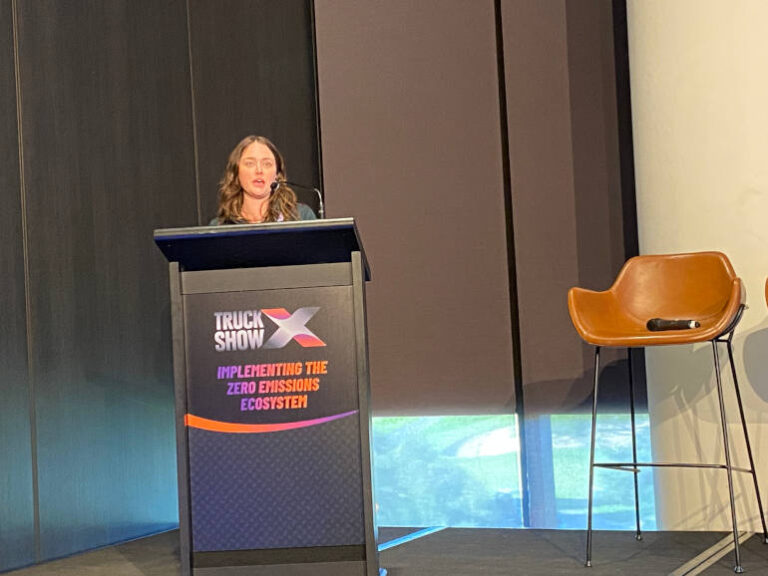In a recent presentation at TruckShowX, Alexandra Kelly, Project Implementation Manager – Zero Emissions Delivery at IKEA Australia, provided an update on the company’s ambitious goal of achieving 100% zero-emission truck deliveries by 2025. Kelly, who has been deeply involved in the electric vehicle industry in Australia since 2009, is currently leading IKEA’s zero-emission delivery strategy across Australia and New Zealand. This initiative is part of IKEA’s broader commitment to sustainability and climate positivity.
The journey towards zero emissions
Kelly began by emphasising the importance of IKEA’s sustainability goals, which are divided into three core areas: healthy and sustainable living, becoming climate positive, and promoting circularity. The zero-emission delivery target falls under the climate-positive category, underscoring IKEA’s commitment to reducing its environmental footprint.
The journey towards zero emissions for IKEA Australia started in 2019 with the introduction of the first electric vehicle (EV) into their delivery service. Since then, the fleet has grown to 51 electric vehicles, including both vans and trucks. This mix allows IKEA to cater to different delivery needs, from smaller parcels to larger truck deliveries.
Strategic partnerships and collaborative efforts
A critical component of IKEA’s strategy has been its collaboration with key partners such as All Purpose Transport (APT), ANC Delivers, and Kings Transport. These partnerships have been instrumental in driving the zero-emission delivery goal forward. By integrating zero-emission KPIs into contracts and working closely with partners, IKEA has created a clear, unified direction for everyone involved.
Kelly highlighted the importance of setting ambitious targets, arguing that such goals are not merely tokenistic but serve as guiding lights that drive real change. These targets help align all stakeholders—from delivery partners to subcontractors—towards a common objective.
Overcoming challenges and embracing new opportunities
One of the major challenges in transitioning to a zero-emission fleet is the lack of charging infrastructure. To address this, IKEA has started investing in charging stations at their stores, providing dedicated charging solutions for their delivery partners. These mid-range AC and DC chargers are currently installed at three locations, with plans for further expansion based on ongoing evaluations.
Another challenge is the fragmented nature of the delivery ecosystem. Many subcontractors or owner-operators work under larger delivery partners, making it difficult to implement uniform changes. To support these smaller operators, IKEA is exploring financing and leasing options for electric vehicles, ensuring that even those with limited resources can participate in the transition to zero emissions.
The importance of collaboration and flexibility
Kelly stressed that collaboration and flexibility have been crucial in IKEA’s journey towards zero emissions. Regular meetings with partners help address issues such as vehicle downtime and optimise fleet performance. This collaborative approach has fostered a culture where partners feel comfortable making mistakes and trying new solutions, knowing they have IKEA’s support.
The company’s openness to new vehicle specifications and delivery methods has also been beneficial. For instance, IKEA has experimented with electric tuk-tuks for shorter delivery routes, finding them to be cost-effective and space-efficient solutions for smaller parcel deliveries.
Executive buy-in and industry advocacy
A significant factor in IKEA’s success has been securing executive buy-in from the start. Senior leaders, including the CEO and Chief Sustainability Officer, are accountable for the sustainability targets, ensuring that these goals are prioritised across all levels of the organisation.
Furthermore, IKEA actively participates in industry dialogues and advocates for policy changes that support the transition to zero-emission vehicles. By engaging with government representatives and participating in parliamentary roundtables, IKEA aims to influence policy in ways that facilitate the adoption of electric vehicles and the development of necessary infrastructure.
The road ahead
As of now, IKEA Australia has reached 40% zero-emission deliveries, a significant increase from the 5% when Kelly started in 2022. The company is optimistic about achieving their 2025 target, driven by improvements in vehicle availability, financing solutions, and charging infrastructure.
Kelly concluded by highlighting the importance of early stakeholder engagement and the willingness to invest time, resources, and effort into achieving ambitious sustainability goals. By sharing their learnings and challenges, IKEA hopes to pave the way for other companies to make similar transitions, ultimately contributing to a more sustainable and climate-positive future.
In summary, IKEA’s journey towards a 100% zero-emission delivery fleet by 2025 is a testament to the power of ambitious targets, strategic partnerships, and a collaborative approach. As they continue to innovate and overcome challenges, IKEA is setting a strong example for the fleet industry and beyond.






